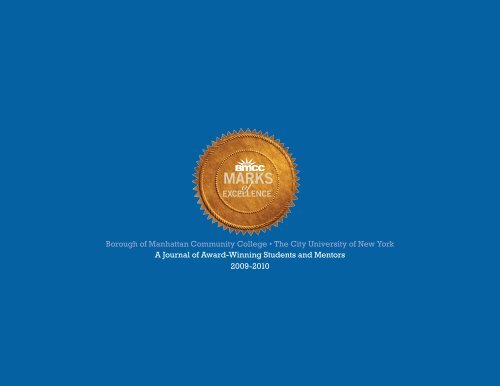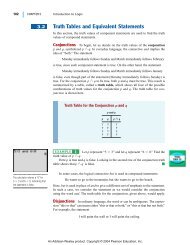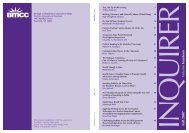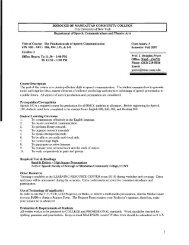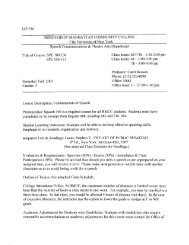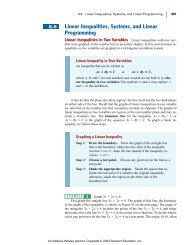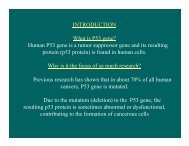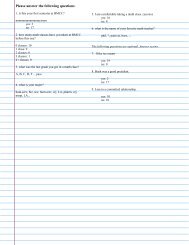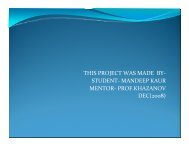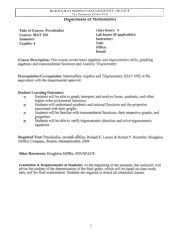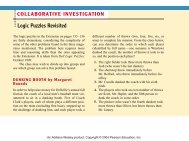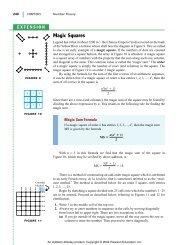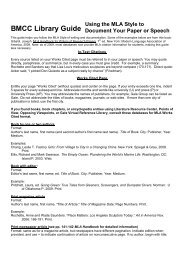to download PDF - Kaplan Educational Foundation
to download PDF - Kaplan Educational Foundation
to download PDF - Kaplan Educational Foundation
- No tags were found...
Create successful ePaper yourself
Turn your PDF publications into a flip-book with our unique Google optimized e-Paper software.
MarkSofEXCELLENCEA Journal of Award-Winning Students and Men<strong>to</strong>rs 2009-2010Welcome <strong>to</strong> Marks of Excellence. I am delighted <strong>to</strong> introduce the firstissue of this annual publication showcasing the extraordinaryacademic achievements of BMCC students.It is no exaggeration <strong>to</strong> say that community colleges have grown <strong>to</strong> becomea powerful driver of workforce development and economic growth—bothhere in New York and across the United States. They have also becomecenters of academic excellence and intellectual ferment, and nowhere isthat more evident than on the campus of BMCC, recognized <strong>to</strong>day as oneof the nation’s premiere urban community colleges.In these pages, you will have a first-hand view of the creativity, dedicationand scholastic achievements of more than 25 BMCC students in a widearray of fields, from poetry <strong>to</strong> economics <strong>to</strong> neuroscience. Some havebeen singled out for prestigious awards, scholarships and honors; othershave competed with—and outperformed—high-achieving students fromfour-year colleges. In all cases, they have drawn upon the support andmen<strong>to</strong>rship of dedicated faculty and staff.“With a men<strong>to</strong>r, you work with someone who actually believes in you andwants you <strong>to</strong> fulfill your full academic potential,” says aspiring physicianGary Waiyaki. “I think for minority students, one of the problems weexperience, especially in an academic setting, is a lack of men<strong>to</strong>rs—peoplewho actually push us. So, working with Science faculty member ManitaPavel was really motivating.”Perhaps the biggest challenge in assembling this issue of Marks of Excellencewas having <strong>to</strong> choose which students <strong>to</strong> feature. Space constraints meantthat many academically outstanding students could not be included. Theiromission by no means reflects on the quality of their achievements.Virtually all of the students featured in Marks of Excellence plan <strong>to</strong> continuetheir studies at four-year colleges, and many will go on <strong>to</strong> pursue graduatedegrees. But what matters <strong>to</strong>day is the extraordinary work that they havedone right here at BMCC, in the arts, sciences and humanities—work thatwould be worthy of the most academically rigorous and highly regardedsenior colleges in the country.Indeed, if there is one conclusion <strong>to</strong> be drawn from Marks of Excellence, it isthat academic excellence is alive and well at BMCC. The following pagesoffer a sampling of some of the exciting things taking place in and aroundour classrooms and labora<strong>to</strong>ries, and introduce you <strong>to</strong> some remarkableyoung men and women. As you learn about them, I trust you will be asgratified as I am.An<strong>to</strong>nio PérezPresident, Borough of Manhattan Community CollegeThe City University of New York
Rising StarsThe sky’s the limit for two leaders-in-the-making.David Thelemaque and Wilson Acuna, this year’s newest <strong>Kaplan</strong> scholars,credit their faculty men<strong>to</strong>rs for encouraging them <strong>to</strong> work hard and focuson life after BMCC.Thelemaque, a math major, asked his African Civilization ProfessorNicholas Ofiaja for a recommendation <strong>to</strong> the <strong>Kaplan</strong> <strong>Educational</strong><strong>Foundation</strong>’s Leadership Program. “Professor Ofiaja really changed theway I thought of myself, and my perception of the world. With every class,I learned more and more about my ances<strong>to</strong>rs,” says Thelemaque. “He alsogave me insight <strong>to</strong> the problems in my community <strong>to</strong>day.”Likewise, Acuna, a science major, received solid advice from formerscience professor Melissa Nashat. “She helped me think about possibilitiesbeyond BMCC and <strong>to</strong>ld me not <strong>to</strong> limit myself; <strong>to</strong> think big and possiblyattend a college outside of Manhattan.”The <strong>Kaplan</strong> <strong>Educational</strong> <strong>Foundation</strong>’s Leadership Program helps highpotential,lower-income and under-represented community collegestudents reach their educational and career goals. Acceptance in<strong>to</strong> thisprogram consists of an extensive application process, including tworounds of in-person interviews. “For those accepted, the program isdemanding and requires a lot of time,” says Jennifer Benn, Direc<strong>to</strong>r ofthe <strong>Kaplan</strong> <strong>Educational</strong> <strong>Foundation</strong>. “We’re working <strong>to</strong> develop leaders.”In addition <strong>to</strong> maintaining their grades, as <strong>Kaplan</strong> scholars, Thelemaqueand Acuna attend weekly meetings at the <strong>Kaplan</strong> headquarters inManhattan and receive advising, career guidance, test preparation andtu<strong>to</strong>ring throughout their time at BMCC.According <strong>to</strong> Sussie Gyamfi, BMCC’s Scholarship and Special ServicesCoordina<strong>to</strong>r, “There are few scholarship opportunities for communitycollege students, which is why this <strong>Kaplan</strong> Leadership Program is so coveted.”Acuna, who is considering a career in environmental science, advisesfuture <strong>Kaplan</strong> scholars <strong>to</strong> take advantage of everything BMCC has <strong>to</strong>offer, both academically and socially, from the Learning Resource Center<strong>to</strong> on-campus clubs.Thelemaque, a former football player, believes being forced out of thesport due <strong>to</strong> injury led <strong>to</strong> his improved grades and eventual acceptancein<strong>to</strong> the <strong>Kaplan</strong> Leadership Program. “Starting now, the sky’s the limit.”“It’s satisfying, and an honor, <strong>to</strong> be called a ‘men<strong>to</strong>r’. It makes mefeel like I’m doing my job well. I’m still in <strong>to</strong>uch with many formerstudents, and hopefully David will be one of them after he graduates,”says Nicholas Ofiaja, Professor Emeritus, Center for Ethnic Studies.
Problems? No Problem!The BMCC Math Team trounces its opponents—and gets a head start on the “big problem-solving exercise”of life.Mathematics isn’t typically thought of as a competitive sport. But trytelling that <strong>to</strong> students on the BMCC Math Team. For the second straightyear, they’ve placed first in the American Mathematical Association ofTwo-Year Colleges Student Math League (SML) competition, NortheastRegion. In addition, team member Xian-Zhen “King” Zhu competedsolo, earning an impressive Second Place in the 2010 CUNY MathChallenge—outpacing a strong field of two- and four-year colleges.“The problems the team trains on are not the kind they would ever see ina math class,” says BMCC Math Professor Jason Samuels, who co-coachesthe team with his colleague, Math Professor Michael George. “Rather,they’re designed <strong>to</strong> test creative problem-solving, a skill that comes in<strong>to</strong>play in every aspect of our lives.”Team member Si Si Cui says the problems “tend <strong>to</strong> be more about logicthan straight math.” Sheng-En Zhang and Owen O’Leary, the team’sunofficial captain, agrees. “They’re really logic puzzles,” he says. “And Ilove solving puzzles.”Professor Samuels, who was on his own high school and college mathteams, says coaching the students “is the continuation of a long tradition.I relish the opportunity <strong>to</strong> pass on the knowledge and techniques that weretaught <strong>to</strong> me.”The two professors model strategies such as finding shortcuts <strong>to</strong> solutions.“That’s important, since we have <strong>to</strong> solve 20 problems in an hour inthe SML competition,” says King, who moved <strong>to</strong> New York City fromShanghai a year ago, and has been known <strong>to</strong> begin conversations withrandom strangers in Time Square <strong>to</strong> practice his English. Why “King?”“Because that was the first English word I learned—and because whenpeople call me King, I feel more confident.”His confidence was tested when he participated in the recent CUNY MathChallenge, winning $2,000 plus $250 for a bonus question. “I alreadybought the ticket <strong>to</strong> go back <strong>to</strong> China this year,” he says. “With the rest ofthe money, I plan <strong>to</strong> buy some robotics kits.” King, who has an interest in“electrical stuff and how computers work,” says “<strong>to</strong> design something, youhave <strong>to</strong> know math.”Whatever career routes the students take, their math team experiencewill serve them well. “Life can be seen as one big problem-solvingexercise,” says Professor George. “Math offers a pure arena in which <strong>to</strong>test our abilities.”Math Team Co-Coaches, Professors Jason Samuelsand Michael George love what they do—bothcoaching students, and math itself. “Problemsolving is a seductive and addictive pastime,”says Samuels. “I’m fascinated by complex andinteresting problems, and enjoy tackling themwith others,” says George.
Poetry Takes FlightThrough spoken word, John Acevedo reaches children’s hearts and minds.When John “Chance” Acevedo chose bilingual childhood education ashis major he asked himself, “Am I ready <strong>to</strong> take 12 Spanish credits? AmI ready <strong>to</strong> teach in my native <strong>to</strong>ngue?” Equally important, was he ready<strong>to</strong> work closely with children’s families? The answer <strong>to</strong> all three questionswas a resounding “yes.”Parents who don’t speak the classroom language, he explains, can’t helpwith homework or communicate with their child’s teacher. “And <strong>to</strong> havethe child translate for them,” he explains, “causes more of a struggle.”Acevedo applies pedagogy he’s discovered at BMCC, in his work as aparaprofessional at East Brooklyn Congregation High School for PublicService in Brooklyn. He credits BMCC professors Yolanda Medina andJean Yves Plaisir, in particular, for what he has learned. “They alwayssay, ‘There’s more than one way <strong>to</strong> teach a child’,” he says. “All childrenare not visual. All children aren’t audi<strong>to</strong>ry. I say <strong>to</strong> myself, ‘Let’s seehow it would help if I add what I’ve learned at BMCC <strong>to</strong> the class I’massisting with’.”Acevedo also reaches children through his poetry collective, El Gri<strong>to</strong> dePoetas, which won the 2009 Commissioner’s Distinguished Award fromthe New York State Department of Health. “Statistics show there are moreyouth diagnosed with HIV and AIDS every day,” he says. “We do a lot ofspoken word and poetry. Whether it’s talking about the everyday strugglesof kids, or the neighborhoods and streets we live in, there’s always aneducational component.”For educa<strong>to</strong>rs, says Professor Plaisir, “<strong>to</strong> have a natural gift with spokenword is quite an advantage because before children learn <strong>to</strong> read andwrite, they speak—and they speak with their imagination.”Through El Gri<strong>to</strong> de Poetas, Acevedo has facilitated workshops at schools,correctional facilities, women’s and homeless shelters. It was Acevedo’sown struggles—his mother was a domestic abuse victim—that brought him<strong>to</strong> poetry, and helped him value the role educa<strong>to</strong>rs fill in children’s lives.“When I was in school,” he says, “my bilingual teacher knew somethingwas wrong. She would ask, ‘Is everything all right at home?’ My best friendbecame a pen and paper. It’s a cliché, but I wrote everything down. NowI’m a s<strong>to</strong>ryteller. I write s<strong>to</strong>ries about the kids I work with, the situationsI’ve been through.”The message he sends <strong>to</strong> children is one of hope. “There’s someone who’sbeen through the same thing,” he says, “who’s here <strong>to</strong> help you.”“We begin with the spoken word because itgives us a window in<strong>to</strong> the mind of the child,the heart of the child,” says Jean Yves Plaisir,Assistant Professor of Bilingual ChildhoodEducation. “I believe John will be an exceptionalteacher, who will use his natural gifts anddispositions as a bilingual teacher and poet<strong>to</strong> make a difference in the lives of immigrantchildren and families.”
Not Resting on Their LaurelsAfter winning the Laurel Award, two BMCC students take time for giving back.At 16, both Nodira Makhmudova and Yohan Garcia emigrated <strong>to</strong> NewYork City—Garcia from Puebla, Mexico, and Makhmudova from theCentral Asian nation of Uzbekistan.They enrolled in GED classes—Makhmudova at BMCC’s Center forContinuing Education and Workforce Development, and Garcia atLehman College—then progressed <strong>to</strong> the CUNY Transition <strong>to</strong> Collegeprogram, eventually winning the Peter Jennings Scholarship/LaurelAward for outstanding GED recipients accepted in<strong>to</strong> a CUNY college.After clearing one more hurdle—the CUNY assessment tests—they begantheir studies at BMCC.Things are going well for the students, but neither is resting on hisor her laurels, as the saying goes. Having gotten themselves on trackacademically, they’re helping others as well.“Although I was born in Mexico, I’ve lived more than a third of my life inthe U.S. and have fallen in love with America,” says Garcia, who balancesworking part time with a full course load. “This country has helped meenormously, so I want <strong>to</strong> give something back.”One of the ways he gives back is volunteering as a conversation leaderwith We Are New York, a project that provides free English practice <strong>to</strong>new immigrants and is co-sponsored by CUNY and the Mayor’s Officeof Adult Education. Likewise, Makhmudova has donated her time at theBMCC Women’s Resource Center, and has worked as a classroom assistantfor students with disabilities. She’s also a regular speaker at BMCC’scontinuing education program, encouraging GED students <strong>to</strong> use thecollege’s resources <strong>to</strong> their fullest advantage.“Volunteerism helps students build self-confidence and develop a senseof responsibility by joining others in important causes,” says DeborahParker, Direc<strong>to</strong>r of the Women’s Resource Center at BMCC.The importance of family is another value the two students share.Makhmudova’s father, a cardiologist, encouraged her <strong>to</strong> considermedicine—but he passed away just before she left Uzbekistan. Garcia, wholost his father during his first semester at BMCC, found support with hissix brothers, who had moved <strong>to</strong> New York before him.Both remain optimistic about their futures. “I want my college life <strong>to</strong> befull of experiences, as well as full of knowledge,” says Makhmudova, whoplans <strong>to</strong> attend medical school for a career as an OB-GYN physician.Enrolled at BMCC, Garcia is working <strong>to</strong>ward an Associate degree inBusiness Management, with a concentration in Travel and Tourism, anddreams of going <strong>to</strong> aviation school <strong>to</strong> become a pilot.“Volunteerism helps students identify where their personal interestslie, and how they are a part of change in our society,” says DeborahParker, Direc<strong>to</strong>r, Women’s Resource Center.
Encore!Encore!Encore!Encore!Encore!Two multi-talented students are awarded Coca-Cola Scholarships.BMCC alumna Lori Colón, and student Sheldon Porter, both LiberalArts majors, each returned <strong>to</strong> college after more than 10 years in theworking world. They thought enrolling at BMCC later in their lives wouldbe hard enough, but it was a walk in the park compared <strong>to</strong> the challenge ofwriting about themselves for a national Coca-Cola Scholarship facilitatedby Phi Theta Kappa.As members of Phi Theta Kappa, an honor society that recognizes theachievements of students at two-year colleges, Colón and Porter receivedinformation about the 2010 Coca-Cola Scholarships, and decided <strong>to</strong> apply.Hard work pays off, and both Colón—who graduated from BMCC inDecember and currently attends Columbia University as a psychologymajor—and Porter received a scholarship, an award, and first team placementin the Coca-Cola All-State Academic Team, proving their personalessays truly struck a chord with the judges.Colón’s Coca-Cola essay focused on why she teaches New York City andJersey City children how <strong>to</strong> Salsa dance. “Teaching and performing,particularly on behalf of children, has become a way for me <strong>to</strong> contribute<strong>to</strong> my community,” she wrote.According <strong>to</strong> Colón, BMCC “caters <strong>to</strong> students who want <strong>to</strong> succeed.”While attending BMCC, she found support and guidance from MichaelGillespie, Associate Dean of Academic Affairs. “As a new student,someone who’d been out of school for many years, I felt overwhelmed byall that lay in front of me. Dean Gillespie loaded me with the encouragementI needed,” she recalls. “He was instrumental in my acceptance <strong>to</strong>Columbia and in receiving my Coca-Cola scholarship, as he wrote lettersof recommendation on my behalf.”Sheldon Porter, a part-time BMCC student, is also a professional songwriter,singer and illustra<strong>to</strong>r. “I was very hesitant <strong>to</strong> be an older student,”he admits, which was the focus of his scholarship essay. “But everyone atBMCC has been wonderful and made me feel at home.” One professor inparticular, Alister Ramírez Márquez of the Modern Languages Department,was instrumental in Porter’s success as a student, encouraging him<strong>to</strong> perform a Spanish song in the classroom. “He <strong>to</strong>ok a genuine interestin my skills as a singer and as an illustra<strong>to</strong>r,” says Porter. “ProfessorRamírez also gave me information about seminars for authors and artists.”“Lori has been exceptional in her capacity <strong>to</strong> balance a full scheduleof courses, a full-time job, and substantial community involvement <strong>to</strong>nurture the talents of the youth in her neighborhood,” says MichaelGillespie, Associate Dean of Academic Affairs.
Silent StrengthIn an essay about his grandfather, Anthony Heyward bringsalive a harsh and often unspoken truth of American his<strong>to</strong>ry.Growing up in the South, Anthony Heyward revered his grandfather as“the definition of masculinity and character”—a perception reinforcedby a tense exchange between the man and a local bank manager. Thatincident is the subject of Heyward’s essay “Granddaddy,” which appearsin the 2009 Nota Bene, literary anthology of Phi Theta Kappa, a nationalhonor society of two-year colleges.“It <strong>to</strong>ok intellect and an incredibly strong will <strong>to</strong> be able <strong>to</strong> walk awayafter having just been cheated,” writes Heyward of his grandfather’srestraint—a survival strength in that era, and woven in<strong>to</strong> other memories:“I would quietly marvel at his callused, hardened hands…his skin shonelike mahogany after a summer shower.” Heyward had been working on“Granddaddy” for some time, he says, “but it was in my last semester atBMCC that I got it in<strong>to</strong> shape with the help of my creative writing teacher,Carlos Hernandez.”As a Phi Theta Kappa member, he also drew guidance from ProfessorPrecious Sellars-Mulhern, who worked closely with the scholars. “I’mglad <strong>to</strong> see he is using his experiences <strong>to</strong> motivate other students,” shesays. Now pursuing a double major—English and education—at CityCollege, Heyward speaks of his “passion for the possibility of activismthrough education, and an understanding of how I might turn thatpassion in<strong>to</strong> ways for students from urban areas <strong>to</strong> overcome some of theirdisadvantages.”grandfather were mowing the grounds of a bank. “Afterwards, I observedmy grandfather having words with the bank manager—apparently overpayment,” writes Heyward. “Finally...he reached out his hand, grabbedthe envelope that was being offered and came back <strong>to</strong> the truck.”They never spoke of the incident, but in 1993, at Granddaddy’s funeral,Heyward <strong>to</strong>ld of how his grandfather “had been cheated, and donenothing <strong>to</strong> defend himself.” His uncles and cousins laughed at him, hesays. “It turned out, he had done this same thing with each and every oneof them—same bank, same bank manager, year after year.” Granddaddy,Heyward realized, had been showing the young men, “what not <strong>to</strong> do,in business,” through the banker’s behavior—and through his own, how<strong>to</strong> walk away from injustice, dignity intact. “He was just trying <strong>to</strong> teachus a lesson.”Precious Sellars-Mulhern, a psychologist andAssociate Professor in BMCC’s CounselingCenter, motivates students <strong>to</strong>ward positivechange. “I have witnessed Anthony walkingaway from a disappointing situation with thesame grace and pride he experienced with his‘Granddaddy’,” she says, referring <strong>to</strong> Heyward’sresiliency at BMCC. “He didn’t allow defeat <strong>to</strong>dampen his spirits or affect his performance.”Heyward’s “Granddaddy”—his name was Joseph Smith—grew up in theGreat Depression, worked as a mechanic, and supplemented that incomewith landscaping jobs. One hot August afternoon, Heyward and his
The Chemistry of CuriosityKwame Amin examines the mystery of a folk remedy from his childhood.In the Caribbean nation of Trinidad and Tobago, people with high bloodpressure often seek relief by eating a native plant called “mauby.” “Folkremedies are popular there,” says Trinidad-born Kwame Amin, a recentBMCC graduate who earned an Associate in Science degree, with honors.“But is there anything <strong>to</strong> these treatments? Do they really work?”Setting out <strong>to</strong> investigate the theories he heard growing up, Aminfound research guidance and support through BMCC Science ProfessorBrahmadeo Dewprashad—and his efforts earned him a first-placeshowing in the chemical sciences division at this year’s prestigious AnnualBiomedical Research Conference for Minority Students.“I derive great satisfaction from men<strong>to</strong>ring students,” says Dewprashad,who supervised Amin’s lab pro<strong>to</strong>cols. “It’s an opportunity for me <strong>to</strong> helpa new generation develop in<strong>to</strong> researchers. They bring experiences,perspectives and diversity that can only enrich the research community.”With Dewprashad’s input, Amin set his project’s direction. “A doc<strong>to</strong>r inTrinidad had done a clinical study with hypertensive patients,” he says,“and found there actually were chemical compounds in mauby that couldlower blood pressure. Our goal was <strong>to</strong> expand on his study and confirmhis findings.”Together, Amin and Dewprashad moni<strong>to</strong>red mauby’s effect on Californiablackworms, a scientifically acceptable stand-in for human subjects whichpresent physiological responses easy <strong>to</strong> observe with a microscope. “Therewas a distinct lowering of their pulse rate, just as the Trinidadian doc<strong>to</strong>r hadreported in humans,” Amin says. “Our findings were consistent with his.”Amin had first taken part in the Biomedical Research Conference in2008. “He worked hard at preparing for presentations by rehearsingmany times, and soliciting feedback on ways <strong>to</strong> improve,” says ProfessorDewprashad. “Mostly I was there <strong>to</strong> observe the work of others,” Aminsays.“I went back <strong>to</strong> BMCC, tidied up my research, collected more data—and, the next year, I guess I impressed the judges.”Sweetening the vic<strong>to</strong>ry was the fact that Amin won out against sophomorestudents from an array of Ph.D.-granting institutions, including severalIvy League colleges. Now in its ninth year, the Conference attracts nearly2,800 individuals, including 1,500 undergraduates and 230 graduateand postdoc<strong>to</strong>ral students.“Winning First Prize shows that there is really no difference betweenour students and those at the <strong>to</strong>p-ranked, four-year schools,” Aminsays. “Professor Dewprashad demands a lot of his students and held us<strong>to</strong> extremely high standards. We wound up beating out some very <strong>to</strong>ughcompetition.”Science Professor Brahmadeo Dewprashad, whogrew up in Guyana, researches indigenous plantsof the Caribbean—many of which he remembersfrom his own childhood. “It is essential that were-s<strong>to</strong>ck the research pipeline—and our studentshave much <strong>to</strong> offer <strong>to</strong> the pipeline,” he says.
Finding Her VoiceA Computer Science major wins a coveted speech award.Amy Cusma didn’t know exactly what <strong>to</strong> expect from her speech class.After all, she came <strong>to</strong> BMCC <strong>to</strong> study computer science.Speech instruc<strong>to</strong>r James Webb surprised Cusma and her classmates bytelling them that one of his ground rules is: “You are not <strong>to</strong> start a speechby saying, ‘Hello’.”“[Cusma] looked at me funny when I said that,” recalls Webb. “But whenpreparing students for their first speeches, the challenge is for them <strong>to</strong>start the speech with something attention-getting.”The next day, when it was her turn <strong>to</strong> give a speech, Cusma “came in<strong>to</strong> theroom, loudly, with this complete burst of energy and zest,” says Webb.Webb asked Cusma <strong>to</strong> participate in a CLASP (CUNY League of ActiveSpeech Professors) Student Speech Competition. Her Informative Speechfocused on the many ways the Internet can benefit senior citizens.Before competition time, Webb had Cusma practice her speech in fron<strong>to</strong>f 16 professors. “They were her <strong>to</strong>ughest audience,” says Webb, who wasconvinced Cusma’s speech was a winner.This spring, Cusma presented her 5-minute Informative Speech,competing against other CUNY students. “Professor Webb taught me how<strong>to</strong> speak from the heart and be passionate,” says Cusma. “After I spoke, Ithought, ‘Professor Webb is right—I might win this’.” And she did.As the first prize winner in the Informative Speech category, Cusmareceived a trophy, a gift card, and a huge vote of confidence. She believesthat Webb’s course will be one of the most valuable classes she’ll take atBMCC.“As a computer science major, I think communication skills are absolutelyessential. When some people hear ‘computer science’ they imagine aperson glued <strong>to</strong> their desk, interacting only with their computer. However,most tech jobs require teamwork, and there’s no place for ambiguity orvagueness when collaborating with others,” says Cusma.“Professor Webb taught me skills that I will use for the rest of my life. Theconfidence I now have as a speaker will help me stand out <strong>to</strong> prospectiveemployers. I can’t wait for my next job interview because I know I’ll ace it!”“I once worked in information technology (IT) and saw that manyof my colleagues excelled in the technical aspects of the job, butwere lacking in the realm of interpersonal communications,”says James Webb, an Instruc<strong>to</strong>r in the Department of Speech,Communications, and Theatre Arts. “Because of Amy’s growth as aneffective communica<strong>to</strong>r, her skills will propel her in<strong>to</strong> the frontlinesof her career.”
Next S<strong>to</strong>p: NeurologyScience major Gary Waiyaki calls BMCC a ‘stepping s<strong>to</strong>ne’ <strong>to</strong> a career in medicine.Science major Gary Waiyaki grew up in Kenya, a developing countrywhere “there are food shortages because of famine or drugs.” One ofthe proposed remedies on how <strong>to</strong> deal with hunger in Kenya and othersuch countries is <strong>to</strong> use genetically modified foods, a <strong>to</strong>pic that hasalways interested Waiyaki. “Children can have certain allergies <strong>to</strong> foodsubstances, such as <strong>to</strong>ma<strong>to</strong>es or peanuts, which can be life-threatening,”says Waiyaki. “That’s one of the reasons why I wanted <strong>to</strong> research theimpact of genetically modified foods.”As a Cleo and Zack science scholar at BMCC, Waiyaki decided <strong>to</strong>research genetically modified foods—foods that have had specific changesintroduced in<strong>to</strong> their DNA via genetic engineering—with the help ofScience faculty member, Manita Pavel.Waiyaki surveyed people of various ethnicities throughout Brooklyn,Queens and the Bronx, asking what they knew about genetically modifiedfoods. Pavel helped him analyze and chart his survey, which he showcasedat BMCC’s Annual Student Research and Honors Presentations.In order <strong>to</strong> conduct paid research as a Cleo and Zack scholar, Waiyaki had<strong>to</strong> complete the course Biology 210, maintain a 3.5 GPA or higher, andpossess a willingness <strong>to</strong> conduct science research with Pavel two <strong>to</strong> threedays a week.Pavel, the coordina<strong>to</strong>r of the Cleo and Zack Project, men<strong>to</strong>red andadvised Waiyaki for two semesters. “Cleo and Zack, which is endowedand supported by former BMCC Science Professor Sylvia Saunders,encourages minority students <strong>to</strong> increase their science knowledge, andteaches them how biotechnology techniques impact their lives and theircommunities,” she says.Waiyaki currently attends the University of Rochester and is an aspiringneurologist. “I view all the men<strong>to</strong>ring programs at BMCC, including Cleoand Zack, as a stepping s<strong>to</strong>ne <strong>to</strong>wards medical school,” he says.A former <strong>Kaplan</strong> Leadership Scholar, Waiyaki fondly recalls theeducational guidance he received at BMCC.“With a men<strong>to</strong>r, you work with someone who actually believes in you andwants you <strong>to</strong> fulfill your academic potential, especially in the sciences,” hesays. “Working with Professor Pavel was really motivating.”“Gary had a clear vision and ambition and worked hard <strong>to</strong> achieve it.He is an intelligent individual with an inquisitive, scientific mind anda desire <strong>to</strong> forge a career in neurobiology,” says Coordina<strong>to</strong>r of Cleoand Zack Project, Manita Pavel.
AdministrationAn<strong>to</strong>nio PérezPresidentSadie C. BraggSenior Vice President for Academic Affairs/ProvostErwin J. WongDean for Academic Programs and InstructionMichael GillespieAssociate Dean of Academic AffairsRobert DiazVice President of Legal Affairs and Faculty and Staff RelationsG. Scott AndersonVice President for Administration & PlanningElena SamuelsAssistant Vice President for FinanceMarva CraigVice President for Student AffairsMichael HutmakerDean of Student AffairsKaren M. WenderoffVice President for College DevelopmentSunil B. GuptaDean of the Center for Continuing Education and Workforce DevelopmentJane Lee DelgadoDean for Institutional Effectiveness and Strategic PlanningJohn MontanezDean for Grants and DevelopmentBarry RosenExecutive Direc<strong>to</strong>r of Public and External AffairsMarks of Excellence is a publication of the Office of Public Affairs, Borough of Manhattan Community College.To learn more about these and other BMCC students, go <strong>to</strong> www.bmcc.cuny.edu.
B O R O U G H O F M A N H A T T A N C O M M U N I T Y C O L L E G E W W W . B M C C . C U N Y . E D U 1 9 9 C H A M B E R S S T R E E T N E W Y O R K


